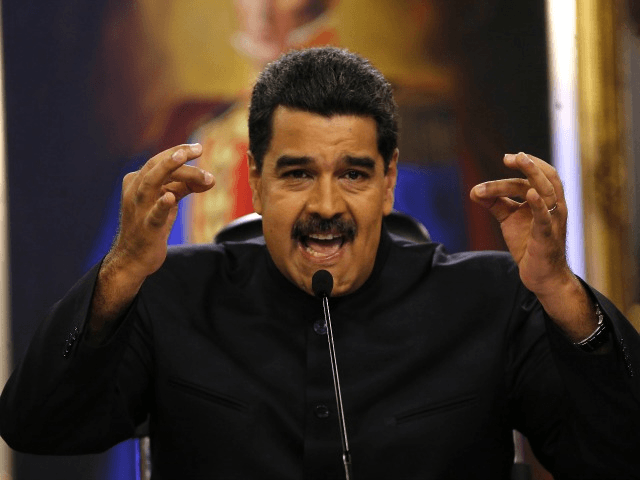Venezuela’s socialist dictator Nicolás Maduro vowed Sunday to go forward with a vote to elect representatives to draft a new constitution intended to cement his stranglehold on power despite international condemnation and pressure to cancel plans to do so.
“I have withstood all of the right’s attacks. You will not defeat me, you have not defeated me, and you will never defeat me,” Maduro told the opposition on his weekly television program Sundays with Maduro. “You will not defeat the revolution of the people, its history, its values, and spirit.”
Maduro went on to insult the opposition, calling for “an adult man” to lead the anti-socialist movement “and not leave it to damaged adolescents full of fascism and unbridled ambitions and hate, lots of hate against the people.”
“Neither economic war nor psychological war nor protests nor threats have divided or weakened the people,” he continued. “On the contrary, all the economic war, all the protests, all the threats have reinforced the unity of the chavista people and amplified our [political] machine and our force of action.”
Maduro has proposed the creation of a National Constituents’ Assembly to draft a new constitution. On July 30, the government will hold an election to appoint the members of this parallel legislator; among the candidates for those positions are high-ranking chavista officials like National Assembly Minority Leader (and suspected drug lord) Diosdado Cabello, widely reviled former Foreign Minister Delcy Rodríguez, and First Lady Cilia Flores.
The Venezuelan people have overwhelmingly rejected the idea of the Constituents’ Assembly, which would effectively replace the democratically elected, opposition-led National Assembly. In a referendum last week organized by the opposition, 98 percent of the 7.2 million Venezuelans who partook voted “no” on a new constitution.
The opposition had regularly demanded the international community support their efforts to hold presidential, gubernatorial, and mayoral elections to replace socialist officials that have replaced many democratically elected leaders arrested on dubious charges of opposing the government, including mayor of Caracas Antonio Ledezma. For many in the opposition, the implementation of a new constitution designed to perpetuate Maduro in power would make the return to democratic rule in the country significantly more difficult.
“We need the support of other democracies to avoid turning into another Cuba,” Julio Borges, the president of the National Assembly, said this week. “We call on the international community, the Vatican, the European Union, the entire continent, who have shown their support to the people of Venezuela in their struggle for democracy, to keep pressuring the national government so that they do not go through with their Constituent fraud,” he added.
Rep. Freddy Guevara, also a ranking member in the Assembly, called the government vote next week “decisive and defining hours for the future of our country” and called for continued street protests and a “civic boycott – no weapons.”
The opposition has not documented a single instance of protesters wielding firearms against the police or military despite Venezuela’s status as one of the most dangerous locations on earth and Caracas’s as the most dangerous peacetime city in the world.
Borges, Reuters notes, is leading a legislative move to replace all socialist officials appointed to positions of authority in direct response to the referendum, including the nation’s Supreme Court justices. Maduro’s secret police, the Sebin, have already begun to arrest those appointed. Maduro himself vowed on his program Sunday that they are “all going to jail, one by one.”
The Venezuelan Penal Forum, an NGO active in the country, has documented 431 prisoners of conscience held behind bars in Venezuela. The Venezuelan website Runrunes has documented 116 deaths during protests since April 1. Protests have continued on a daily basis for the past 111 days.

COMMENTS
Please let us know if you're having issues with commenting.